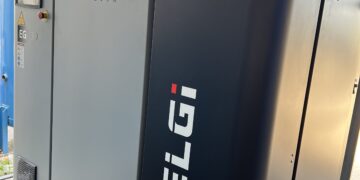Coronaviruses can be detected in wastewater several days before the first symptoms appear. This offers the possibility to collect case numbers more quickly, to map the course of infection more precisely, and to detect new COVID-19 variants and their spread earlier. The project network “Systematic Monitoring of SARS-CoV‑2 in Wastewater” coordinated at the Karlsruhe Institute of Technology (KIT) aims to exploit this potential and to examine whether and, if so, how a wastewater-based COVID-19 early warning system can be implemented in Germany. The European Union is funding the project with around 3.7 million euros.
“This interdepartmental research project offers the opportunity to pool scientific know-how and previous experience in wastewater monitoring across Germany and to systematically use it in the containment of the COVID-19 pandemic.”
- Dr. Verena Höckele, Project Coordinator at the Karlsruhe Project Management Agency
The pilot project, which started in February and will run for one year, will successively involve 20 locations nationwide. At these sites, mixed water samples will be taken twice a week over a period of 24 hours from the inflow of the wastewater treatment plants, processed and analyzed using a PCR test. Subsequently, the results will be linked to pandemic data from local health departments and, if possible, incorporated into the pandemic situation assessment.
Detect virus variants faster with wastewater monitoring
“The method of determining the frequency and dynamics of SARS-CoV‑2 viruses via municipal wastewater has already been successfully tested in Germany in the course of individual research projects,” says Professor Harald Horn, head of the Water Chemistry and Water Technology department at the Engler-Bunte Institute. Horn is convinced that it could not only help to better estimate the number of unreported cases of infected persons, but also to detect the spread of variants and mutations more quickly than is possible by testing individual persons.
In the project, the researchers now want to analyze, on the basis of comparable results, which methods could be suitable for area-wide monitoring and which data must be collected for this purpose in order to be able to detect coronaviruses in complex wastewater. This is currently evident in the detection of the omicron variant, whose virus fragments are predominantly excreted via the upper respiratory tract and, compared to the delta variant, only one-third of them enter wastewater. A particular challenge for the scientists is therefore to further improve the quality of sample collection, laboratory analysis and data evaluation.
At the end of the pilot phase, a decision will be made as to whether nationwide wastewater monitoring or rather representative monitoring should be recommended for Germany. Such a nationwide early warning system against COVID-19, which in perspective would also be suitable for other pathogens such as polio or influenza viruses, is already in use in the Netherlands, Canada and Australia.
ESI-CorA: Funding and project partners
The project “Systematic Surveillance of SARS-CoV‑2 in Wastewater” (ESI-CorA) is funded by the European Union within the framework of the Emergency Support Instrument (ESI) with approximately 3.7 million euros. It was initiated by the Federal Ministry of Health, the Federal Ministry for the Environment, Nature Conservation, Nuclear Safety and Consumer Protection and the Federal Ministry of Education and Research. The Project Management Agency Karlsruhe (PTKA) at the Institute coordinates the project, and partners besides the Institute are the Technical University of Darmstadt, the Federal Environment Agency and the Robert Koch Institute. A steering committee consisting of representatives of the federal government, the states and associations will decide on the continuation of the results after the end of the pilot project in February 2023. (sur)
As “The Research University in the Helmholtz Association”, the Institute creates and communicates knowledge for society and the environment. Its goal is to make significant contributions to global challenges in the fields of energy, mobility and information. To this end, about 9,600 employees cooperate on a broad disciplinary basis in natural sciences, engineering, economics, and humanities and social sciences. KIT prepares its 23,300 students for responsible tasks in society, industry, and science through research-oriented university studies. Innovation activities bridge the gap between knowledge and application for the benefit of society, economic prosperity, and the preservation of our natural resources. KIT is one of the German universities of excellence.

















